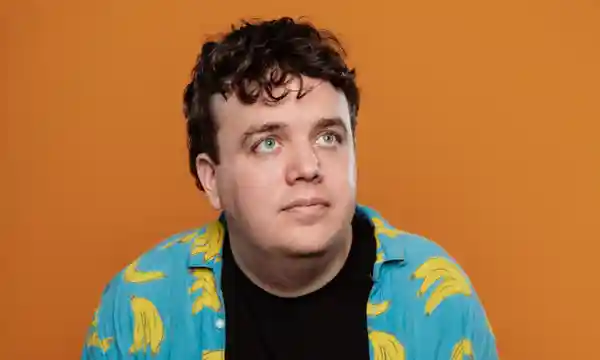
From Fern Brady to Hannah Gadsby, a host of comedians have discovered that they are autistic. What is it about standup that lends itself so well to neurodivergent people?
In 2020, Pierre Novellie was previewing an early version of his standup show Why Can’t I Just Enjoy Things? – things such as holidays and trips to the cinema (due to the “all the chewing and rustling packets”) – when he was interrupted by an audience member’s polite heckle. “He said: ‘You sound like me,’” recalls Novellie. The comedian asked what that meant. “He said: ‘I have Asperger’s – I think you have Asperger’s.’”
The next day, Novellie began seriously looking into the prospect that he was autistic (the term Asperger’s is no longer commonly used, partly because of its namesake’s Nazi affiliations, but some autistic people still refer to it). He began taking multiple online tests, alternating between answering completely truthfully and “in the most normal, sociable way” he could, yet both approaches put him firmly above the threshold for autism. In 2022, he finally received a formal diagnosis – by which point he’d realised that the title of Why Can’t I Just Enjoy Things? wasn’t rhetorical. “It turned out there was an answer: these were inherently autistic routines,” says Novellie (in the case of rustling packets, sound sensitivity is common in autistic people). “So that became the ending of the show.”
Novellie is far from the only autistic comedian on the circuit. In fact, autism seems to be significantly overrepresented among professional standups. (It is estimated – perhaps conservatively – that about 1% of the world’s population are autistic.) Earlier this year, the Scottish comic Fern Brady won the inaugural Nero nonfiction award for her memoir Strong Female Character, a chronicle of the struggles that led to her autism diagnosis. Hannah Gadsby, who rose to fame with the multi-award-winning 2017 show Nanette, also received a diagnosis of autism as an adult, while other comedians who have said they are autistic include Jim Jefferies and Bethany Black, alongside a clutch of up-and-coming standups who discuss their diagnosis in their work (Larry Dean, Ashley Storrie).

In 2014, Jerry Seinfeld said he believed he was “on the spectrum” (a statement that was controversial at the time, but is less so a decade on as self-diagnosis has become more widely accepted), and last year, in an interview with the Times, Stewart Lee revealed that during lockdown he’d received an unofficial autism diagnosis from his GP after filling in a questionnaire. “And it just made me laugh because once you know it’s really hilariously obvious,” he said, having belatedly realised his stage persona – an exaggeration of “the most problematic parts of me” including “moral absolutism” and a “failure of nuance” – was a “textbook example” of autism.
oe Wells was informally diagnosed as autistic as a teenager and formally at 30; his routine about his non-autistic brother – “He loves making eye contact, he’s really into loud, sudden noises” – went viral a few years ago. After a youth spent “struggling with the rules of social things”, he started performing comedy in his 20s and immediately felt “these are my people. In comedy, it’s good to be different and unusual, that’s very much what drew me to it”. In her memoir, Brady – who, like Novellie, was told she might be autistic by an audience member – echoes that sentiment, writing: “Everything about my personality that made me a problem at university or in most jobs seemed to be treated as some sort of magical power in standup.”
Both Wells and Novellie say that the lifestyle of a standup – no office environment, no boss, plenty of autonomy – was another attraction. For Novellie, office work is, “from an autistic point of view, constant lying. You pretend your job is your passion, you pretend to like your boss, you pretend to laugh at something someone said.” As a form of conversation, both feel standup is easier to navigate than idle chit-chat with colleagues; Novellie describes it as “structured socialising”. On stage, says Wells, “I understand how well I’m doing [by observing whether] people are laughing or not. It’s an easier conversation to calculate than a conversation in the office where someone seems a bit off; is that because they’re hungover? Is it because you said something that was inappropriate?”
You rearrange a sentence and make it funnier. Many autistic brains are more suited to that sort of problem-solving
Autism is not the only form of neurodivergence that is prevalent in standup according to Novellie; he says he knows many comedians with ADHD. However, he and Wells both believe some autistic traits are especially useful when it comes to creating and performing live comedy. In order to finesse a routine, the standup must tell the same jokes over and over again, which means “you need to be obsessive and enjoy repeating things”, says Novellie (intense interests and repetitive behaviour are common autistic traits). Joke-writing itself is also a more scientific enterprise than it might appear. Wells describes it as a “systemising way of writing: you can rearrange a sentence and then it will be funnier. Many autistic brains are more suited to that sort of problem-solving.”
Yet that doesn’t mean autistic standups aren’t just as suited to off-the-cuff comedy. Charlie George, a standup and comedy writer, sought out an autism diagnosis after lockdown ended and she was left unable to function due to a series of “mini burnouts”. She thinks “the fact that autistic people can be quite blunt and direct can be helpful in audience interaction because we’ll just say what we’re thinking and that can get a great big laugh because it relieves tension.” At the same time, she agrees with Wells and Novellie that the autistic trait of “obsessive thinking in great detail about subjects we’re interested in” is an advantage when it comes to finding new comedic angles, as is the fact that “autistic and neurodivergent people often get fascinated by things that other people might have missed – a unique perspective is really great for comedy.”
Yet equally key is the relatability of what the comedian is thinking and feeling; so much laughter in standup is the laughter of recognition. This presents a contradiction: if autistic people are experiencing the world quite differently to their neurotypical counterparts, why do audiences seem to relate so much? Novellie’s current show, Why Are You Laughing?, is all about this conundrum: “It almost doesn’t make sense. It’s one thing if you’re autistic and you do some elaborate, complex show at the fringe, but I’ve been doing shitty nightclubs for years.”

One conclusion Novellie came to is that “a lot of being autistic seems to be to do with excess sensitivity. And that is always a boon when it comes to observing for observational comedy.” He believes autistic comedians are often noticing the same things as neurotypical people, only more so, leading to “this fun little ‘Oh yeah – that is what it’s like!’ moment for people because [most of the time] they’re busy being not hypersensitive to their environment.”
George has another idea about why audiences might identify with her comedy, having asked herself “if in the past I was the freak, the weirdo, the outsider, the oddball, why when I’m up there is everybody relating to it? I think, truthfully, everybody must feel awkward, weird, socially inept and really want to belong but perhaps don’t feel as if they do.”
George says she initially found her diagnosis “mortifying” but after hearing the stories of other neurodivergent comedians – including Brady – she no longer feels embarrassed. Not only are autistic standups role models, she explains, they are also uniquely placed to remove stigma and bust myths around autism. That’s because “one of the beautiful things about standup is you step people through your experience”, George says, something she is now trying to do with autism. “I describe it now as: I’m vegan but for noise. Or getting late-diagnosed is like realising you’re a Jedi but your lightsaber gives you a headache.”
Autistic humour is different to neurotypical humour in the same way that countries have different senses of humour
One myth these comedians are implicitly debunking is the idea that autistic people “don’t have any sense of humour”, as Wells puts it. I tell Novellie that I recently took an online questionnaire designed to identify traits of autism, which asked users how much they agreed with the statement: “I am often the last person to understand a joke.” He tells me that question is “out of date or misphrased. It would be more accurate to ask questions about taking certain things literally as opposed to figuratively – but it doesn’t mean you can’t understand jokes because there are plenty of completely literal jokes.”
The fact that some autistic people find it hard to grasp non-literal language has certainly contributed to the myth, as did the controversial work of Hans Asperger. Yet Wells also believes “autistic humour is different to neurotypical humour in very broad terms; in the same way you might talk about different countries having different senses of humour.” He recounts overhearing a group of mechanics joking about ordering an extra-large fleece for one of their number who was very slim. “That to me is very neurotypical humour because it was about social bonding and it’s not actually funny, you couldn’t do that in a comedy club.”
Instead, what these comedians are doing in comedy clubs is an undoubtedly more complex enterprise: transforming their experiences as autistic people into comedy for largely neurotypical audiences, without pandering or making autistic people figures of fun. “I never want to do stuff that’s like: ‘I’m autistic so I said this silly thing, how embarrassing,’ because actually a lot of the things [I do] which are seen as socially wrong, I actually think are a good way of doing things,” says Wells.
George finds that although she does make her autistic behaviour “the butt of the joke” a lot, that approach also means she’s “owning a part of myself that other people might tell me I should be ashamed of”. She’s recently written a “cocky” rap about autism to celebrate her newfound understanding that “the reason I’m good at comedy and the reason I am the person I am is because of my autism. That’s where I’m at now.”